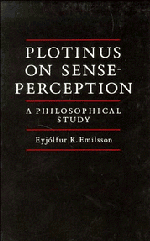Book contents
- Frontmatter
- Contents
- Acknowledgements
- Introduction
- I Plotinus' metaphysics
- II Plotinus' views on the soul and man
- III The relation between the eye and the object of vision
- IV Sensory affection
- V The unity of the senses
- VI The objects of perception
- VII Perceptions as acts and forms in perception
- VIII Conclusions
- Abbreviations
- Notes
- Bibliography
- Index
V - The unity of the senses
Published online by Cambridge University Press: 07 May 2010
- Frontmatter
- Contents
- Acknowledgements
- Introduction
- I Plotinus' metaphysics
- II Plotinus' views on the soul and man
- III The relation between the eye and the object of vision
- IV Sensory affection
- V The unity of the senses
- VI The objects of perception
- VII Perceptions as acts and forms in perception
- VIII Conclusions
- Abbreviations
- Notes
- Bibliography
- Index
Summary
Plotinus' views concerning the unity of the senses, and the inferences which he draws from them, constitute what is perhaps the most original aspect of his theory of perception. I want to claim that Plotinus’ position on this issue is the result of a historical dialogue and represents the sort of statement that one might expect a dualist to make after the floor has been held for some time by the Stoics and Peripatetics. In order to set Plotinus’ views in a proper context, we shall, before we turn to them, consider what some of his predecessors had to say about this subject.
The views of Plotinus’ predecessors on the unity of the Senses
In the Theaetetus at 184 D ff. Plato distinguishes the senses from one another by reference to the differences in their objects: sight has proper objects that cannot be perceived through any other sense, so does hearing, and so does each of the other senses. But above the special senses he posits a central faculty of perception. With this faculty “we apprehend the black and the white through the eyes, and objects of other kinds through the other senses” (184 D). Here, we need not go into the details of Plato's analysis of the function of this central faculty, interesting as they are in themselves. It suffices to point out that Plato's introduction of a central faculty is prompted by observations about the unity of consciousness in perception: “It would be very strange,” he says, “if there should be many senses sitting in us as in wooden horses, and all these things should not converge in some single nature” (184 D).
- Type
- Chapter
- Information
- Plotinus on Sense-PerceptionA Philosophical Study, pp. 94 - 112Publisher: Cambridge University PressPrint publication year: 1988



